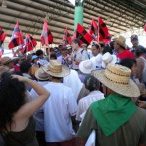
6 December 2010 | News | Climate Justice and Energy | COP 16
Double-Edged
Brazil and its role at the international climate talks
Download: MP3 (3.3 Mb)
The role of Brazil at the negotiations of the COP16 on Climate Change in Cancun is considered “contradictory” by environmentalist organization Nucleo/Friends of the Earth Brazil (NAT), which is following the process closely and is participating in the parallel activities.
The South American country supported progressive positions during the first week of the COP, especially those of the Bolivarian Alliance for the Americas (ALBA) which defended the Kyoto Protocol.
At the same time, Brazil accepts the carbon market, which has given way to mechanisms that allow industrialized countries to avoid their pollutant emission reduction obligations, by “offsetting” their emissions. Brazil holds extremely dangerous positions with reference to climate finance, stated NAT-Friends of the Earth Brazil.
Real World Radio interview Lucia Ortiz, member of the environmentalist organization. The activist stated that “the role of developed countries is key to block any bad agreement at this conference”, and added that “a more pro-active Brazil” is necessary. Anyway, Ortiz recognized and highlighted the support provided by her country to ALBA.
The ALBA countries announced on Friday in a press conference that some developed countries (Japan confirmed) had said during a closed informal meeting that there is no chance that an agreement will be reached on a second commitment period of the Kyoto Protocol (2013-2017) in Cancun.
The official representatives of Bolivia, Venezuela, Nicaragua, Ecuador and Dominica warned in the press conference that if this position by the developed countries continued, the ALBA was not willing to agree on any other issue at these negotiations.
“Brazil´s decision to support the other developing countries, especially ALBA countries by saying that this conference will serve no point if the countries don´t commit to a second commitment period under the Kyoto Protocol, was very interesting”, said Ortiz, Latin American coordinator of the FoEI Climate Justice and Energy Program.
Last week, Brazilian president Luiz Inacio “Lula” da Silva publicly said that he wouldn´t attend the conference in Cancun because nothing important was going to be decided. According to Ortiz, after this beginning, Brazil had a “low-profile attitude and was very quiet”. Some sectors of the Brazilian civil society point out the government is being cautious to avoid conflicts in the path towards the UN Conference on Sustainable Development or “Rio+ 20”, to take place in May, 2012, in Rio de Janeiro.
But Brazil was back at the public sphere when it defended a second commitment period under the Kyoto Protocol. The first period comes to an end in 2012 and the States should agree on the emission reductions for the second period, among other things, but they are behind, since the Parliaments need time to ratify the agreements.
But on other issues, the positions of Brazil are worrying, according to Ortiz. “Brazil has extremely dangerous positions on, for instance, climate finance”. The activist highlighted the fact that Brazil is not against the potential management of climate adaptation and mitigation funds to the Global South by the World Bank. “In addition, since Copenhagen (COP15 held in December, 2009), Brazil changed its position against the expansion of the carbon market. Its position is difficult to understand, because they say their reject the offsetting of emissions but not the carbon market”, she added. It is precisely in the carbon market where emissions are offset with the purchase of credits by the North generated by projects in the Global South.
Ortiz said that with these projects “emissions are not really reduced, they are just flexibility mechanisms”. They are “a trick to avoid doing what needs to be done, that is a reduction of emissions by the countries historically responsible”, she said.
The FoEI Climate Justice and Energy coordinator said that Brazil is also interested in the REDD mechanism (Reducing Emissions from Deforestation and Forest Degradation in developing countries). She said that the negotiations on this issue have not advanced much, but warned about the potential attempts outside the multilateral framework.
Ortiz highlighted the need by developing countries to control the process of negotiations in Cancun and push for fair agreements. “The monitoring by developing countries is key to change the balance of power at the negotiations, because most countries defend the interests of the corporations, and not the peoples”, she said. The environmentalist also highlighted the international movement for climate justice in Cancun and the “Peoples´ Agreement” which came out of the Climate Change Summit held in Cochabamba, Bolivia, in April, 2010. “We don´t want any more “Copenhagens”” said Ortiz, with reference to the anti-democratic agreement opposite to the Kyoto Protocol signed in that city at the COP15. “We say yes to Cochabamba”, she concluded.
Photo: Real World Radio







